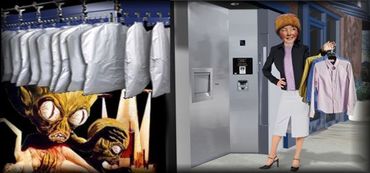Dry cleaning
Exactly what dry cleaning (aka martinizing) entails is a mystery to the majority of people. Most drop their expensive clothes off at a dry cleaner and return a few days later to pick up their now-clean clothes, conveniently wrapped in a plastic that is deadly to infants and pets. Fully 95 percent of all dry cleaning customers have absolutely no idea as to how the process works, what chemicals are used, how many individuals are involved, which god(s) they worship, how many human sacrifices are made to these gods, or whether or not the gods themselves require dry cleaning, not to mention live goats.
Until recently, the secrets of dry cleaning were only available to an elite group of mostly Asian people known as the Illumiwashi. Common folklore on the Illumiwashi contains rumors of ritual child abuse, saturnalias at Bohemian Grove, and a code of secrecy rivalled only by Skull and Bones. Fortunately, like Skull and Bones (whose exhaustive Guide to the Secrets of Skull and Bones was published in 2002 by Harper Collins, ISBN 123654-2334-3423), the secrets of dry cleaning have recently been made readily available in a free publication of the US Government, How You Can Become a Dry Cleaner Today! available from the Consumer Information Center, Pueblo, Colorado, 81005. (Please note that this publication is only available to US citizens; those who live outside the United States must, as always, continue to live in ignorance, poverty, and fear.)
Nevertheless, the story of the Illumiwashi, inextricably intertwined with the history of dry cleaning itself, is a fascinating one — full of suspense, tragedy, mystery, murder, repetitive TV test patterns, and runny French cheeses. Worthy of an entire Doris Kearns Goodwin novel in and of itself, it is a story tailor-made for a publicly-editable reference-parody web site, which unfortunately makes it inappropriate to relate here.
Dry Cleaning Through the Ages[edit | edit source]
Patrick Duffy was named the patron saint of dry cleaning back in the 11th century by Pope Urbanite XVI. With his supernaturally kickass looks and flamer lifestyle, he traveled from town to town cleaning clothes telling people he could clean their clothes without any liquids for 20 shillings. Historians recently discovered he was full of himself. He got bored of lying to people and stealing their women, so he submerged into the Earth. Later on, people shot a sandblaster at their clothing and found out later that it was clean. Today, they use unknown chemicals, which kinda defeats the purpose of dry cleaning.
The Economic and Political Implications of Martinizing[edit | edit source]
"Martinizing," named after Rat Pack crooner and theoretical chemist Dean Martin, revolutionized the dry cleaning industry. Essentially, the process involves laying out a soiled garment on a flat surface, silk-screening a publicity photograph of Martin directly onto the fabric, and returning it to the customer. The new process proved so popular that it swept the entire industry within months, as "old-tech" dry cleaners were forced to either re-tool or go out of business.
Some of the larger dry-cleaning operations were less than thrilled about this prospect, and there are still some "hard-liners" who continue to lobby their various national governments all over the world (except for France, who see this as an insult to Martin's co-star Jerry Lewis) to outlaw Martinizing and return the dry cleaning industry to its roots.
It should also be noted that only six years before the advent of Martinizing, another new technology known as Vulcanizing made significant inroads into the dry cleaning industry. This process, which involves placing a soiled garment in a blast furnace, waiting for the customer to return to pick it up, rendering the customer unconscious with chloroform, and finally using plastic surgery to change the shape of the customer's ears, proved somewhat less popular. A later attempt to improve the Vulcanizing procedure by using large wooden clubs instead of chloroform inexplicably did little to increase its level of acceptance.
Are Your Clothes Really That Dirty?[edit | edit source]
There are several ways by which you can determine if your clothes, bed-linens, or slipcovers require dry-cleaning.
- Death from asphyxiation
- Being attacked by rabid weasels
- Being worshiped as the Pure Reincarnation of the Buddha by roving bands of Tibetan lamas
- Supermodels find you oddly compelling, but then become disinterested once you take your clothes off
- Strangers approach you asking questions in Swedish
- Waking up in the morning requires the intervention of the local Fire Department
- The local sheriff aims a rifle at your head, only to recognize you and say he thought you were "one of them creepy zombie fellas"
Alternatives to Dry Cleaning[edit | edit source]
- Death from asphyxiation
- Get a "real" job where they don't make you wear suits
- Pay Patrick Duffy a large sum of money
- Sandblasting (see above)
- Tougher anti-dirt laws
- Mother's spit, the ultimate spot remover
- Outsource laundry to Communist China and don't ask what they do with it
You can join them on their next Colonization at Uncyclopedia:Imperial Colonization.
